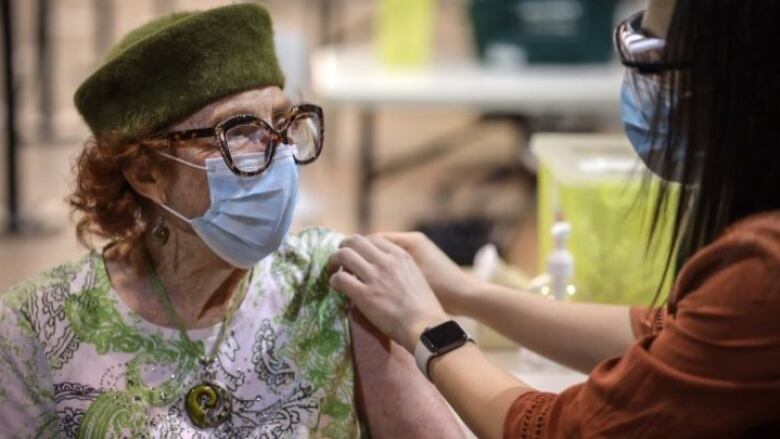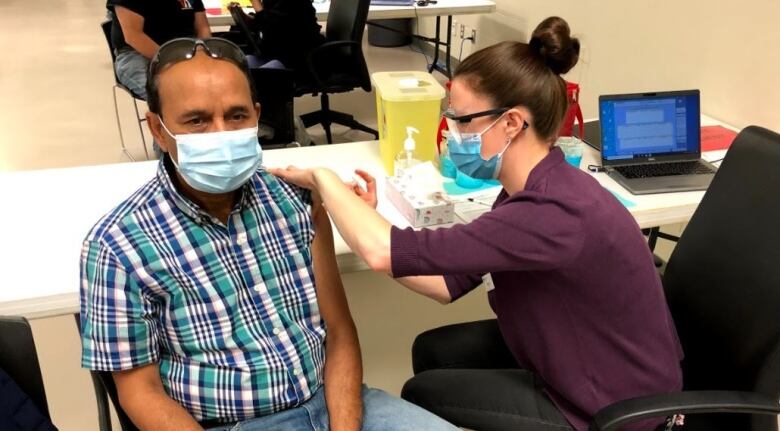Everything you need to know about COVID-19 in Alberta on Friday, March 19
Alberta has opened up its COVID-19 vaccination appointment bookings to the entire Phase 2A age cohort starting Friday at 8 a.m., meaning anyone born in 1956 or earlier, or First Nations, Mtis and Inuit people born in 1971 or earlier, can book a shot.
Next few weeks are critical in preventing a 3rd wave of COVID-19, Hinshaw says

The latest on the Pfizer-BioNTechandModernavaccines:
- Alberta has opened up appointments for the Pfizer-BioNTechandModernavaccinesto everyone eligible in Phase 2A on Friday after starting the rollout on March 15. This means that as of 8 a.m. Friday, the following can book appointments:
- Anyone born in 1956 or earlier.
- First Nations, Mtis and Inuit people born in 1971 or earlier. (Those living on-reserve or on-settlement should book through a local clinic.)
- Staff and residents of licensed seniors supportive living facilitiesnot included in Phase 1.(Theywill receive a direct email from AHS with a unique link to go online and book their immunization appointments.)
- How to bookif you're eligible:
- Participating pharmacies:Now booking all eligible ages, no matter the birth year.
- Alberta Health Services (online or 811)
- First Nations, Mtis and Inuit people born in 1971 or earlier who are living on reserve or on settlementshould book through a local clinic.
- About 418,663doses of vaccines have been administered and92,378 Albertans have been fully vaccinated as of Thursday, said Dr. Deena Hinshaw, Alberta's chief medical officer of health.
- The rate of vaccination is9,468doses per 100,000 population.
- Vaccinations for those75 and older(born in 1946 or earlier) arestill available at thosepharmaciesas well as atimmunizationsites operated byAHSacross the province.
- The Alberta government laid out its plan Monday forPhase 2Bof the vaccine rollout, which will be for people born 2005 to 1957 (ages 16 to 64) with certain high-riskunderlying health issueslikechronic conditions affecting certain organsand those suffering from cancer. For the full list of health conditions see here.It's expected that the timeline will be between April and June, but it will dependon supply.
- The governmentsaysPhase 2C of the rolloutwill include health-care professionals such as physicians, nurses, pharmacists, dentists andsupport staff. As well, designated support persons for those living in continuing care will also become eligible in the stage.
- AHSannounced Monday it wouldopen alarge-scale vaccination centreat theCalgaryTelusConvention Centreon April 5. The site will have 100 vaccination stations and, at full capacity,it could deliver5,000 shots per day, officials say. There will be no drop-in appointments. Free parking will be provided.
- Ifshipments arriveas scheduled, the province saysall adults in the provincewill receive their first dose by the end of June.
- Premier Jason Kenneyannounced Thursday that 259 pharmacies in 107 communities are now administering COVID-19 vaccine across the province.Participatingpharmaciescan administer about66,000 doses per week, he said.
- Kenney said he expects over 500 pharmacies will be participating by next month, reiterating hispromise to offer at least one dose to all Albertan adults by June.
The latest COVID-19 numbers:
- On Thursday, Alberta reported 505new cases of COVID-19, bringingthe number of activecases in the province to 5,084 an increaseof 166from the day before.
- Of the new cases, 91 involved the highly infectious variant strains of the virus, the highest number recorded yet,which now accounts for12per cent of all active cases of COVID-19 in Alberta.
- Hinshaw pointed to an explosionin cases in Lethbridge.Three weeks ago, on Feb. 25, Lethbridge had 196 active cases. On Thursday, the province reported Lethbridgereached 469 active cases.
- Hinshawattributed the rise to family gatherings and faith gatherings.
- She recommended thatAlbertansremain vigilant in social distancing and masking, and put any spring break travel or party plans on hold.
- To date, 1,169cases involving variants of concern have been identified. Of those,575 people have recovered while 14 have died.
- Almost all variant cases arethe strain first identified in the U.K. (B117), and 17are the strain first identified in South Africa.
- On Sunday, Alberta also reported the first two cases of the variant strain first identified in Brazil, known as P.1.
- The province reported 264 people were being treated in hospital for COVID-19,with 43people in intensive care beds.
- 10,900coronavirustests were completed Wednesdaywith a positivity rate of about 4,8per cent.
- To date, 133,086 Albertans have recovered from COVID-19.
- Currently, 297 schools, about 12 per cent, are on alert or have outbreaks, with 1,241 cases in total:
- 212 schools are on alert, with 411 total cases.
- 85 schools have declared outbreaks, with a total of 830 cases.
- 214 schools say in-school transmission has likely occurred, with113reporting only one new case as a result.
- There are currently 94 active and 9,221 recovered cases at long-term care facilities and supportive/home living sites.
- To date, 1,231 of the 1,957 reported deaths (63 per cent) have been in long-term care facilities or supportive/home living sites.

The latest onAstraZeneca-Oxford/Covishieldvaccine:
- As of March 10, Alberta began offering theAstraZeneca-Oxford/Covishieldvaccine as an option foradults who do not have a severe chronic illness in a staggered rollout toAlbertans born 1957 to 1971 and First Nations, Mtis and Inuit (FNMI) persons born 1972 to 1976.
- However, not everyone in those age ranges wasimmediately eligible: the province staggered the rollout starting with the oldest and expanding it a birth year or two at a timedepending on vaccine supply.
- The province received only 58,500 doses ofAstraZeneca-Oxford/Covishieldin its first shipment of thevaccine. Asof Sunday afternoon,Hinshawsaidmore than 92 per cent of the province's current supply of AstraZeneca-Oxfordand Covishield vaccine doses had been booked.
- Given the dwindling supply, the province shut down online bookings, with limited appointments available only by calling Health Link at 811.
- The government says more appointments and birth years will be added as moreAstraZeneca supply becomes available.
- The U.S. has announced planssend 1.5 million doses of AstraZeneca vaccine to Canada, which could arrive by the end of the month. Plans are still being worked out.
- Healthy Albertans in those age ranges can also choose to wait until Phase 2D begins in May to receive the Pfizer or Moderna vaccine if they don't want theAstraZeneca vaccine. However, AHS stressed thatAstraZenecahas beenproven to be highly effective in preventing serious illness and death in adults 18 to 64.
The latest on reopening and restrictions:
- Kenneyand Hinshaw saya final decision has not been made about moving the province into the next step of reopening.
- The province says any decisions on moving toStep 3of the reopening will be made on March 22at the earliest.
- Social gatherings are the top source of transmission of COVID-19 so all indoor social gatherings public and private remain prohibitedthroughout the province as they have been since Dec. 8. Outdoor social gatherings can have up to 10 people. The rules areenforceable with $1,000 fines.
- All indoor social gatheringsare limited to household members only.
- People who live alone can have up to two close contacts:
- These must be the same two contacts throughout the duration of the restriction.
- If the close contacts do not live alone, visits cannot be held at their home.
- Single parents who only live with their children under 18are permitted to have up to twoclose contacts.
- Alberta moved toStage 2 of its reopening plan startingwith a scaled-back approach to easing restrictions on March 1 and again on March 8.
- Retailstores and malls wereallowed to increase their capacity to 25 per cent of fire code occupancy, and youth sports teams and activities wereallowed to resume with up to 10 participants. Masks and physical distancing arestill required.
- Restrictions alsoeased for child, youth and adult performances, includingsinging, theatre and playing wind instruments, though participants must follow the same restrictions as for youth sports.
- Banquet halls, community hall and hotels canhost permitted performance activities, wedding ceremonies with up to 10 people, and funeral services with up to 20.
- Rules for indoor fitness still require that gym visits must be scheduled or by appointment no drop-insallowed.
- Low-intensity individual and group exercises areallowed without a trainer. Public health rules must be followed, including wearing masks and physical distancing.
- High-intensity activities without a mask are allowed only forone-on-one workouts with a trainer. Trainers must still be masked.
- No sports games, competitions, team practice or league play is allowed.
- The Calgary Board of Education says it will continue to offer an online learning option for Grades 1 to 12 in the years to come through its CBe-learn platform, but the end of this school year will also mark the end of the district Hub online learning program that launched last fall.
The latest on COVID-19rapid testing:
- Last week, the Alberta government announced it would ship nearly one million rapid COVID-19 tests to be used in hospitals, schools, long-term care facilities and private companies including Suncor, Syncrude, CNRL and WestJet.
- A COVID-19 rapid testing pilot project toscreen students and staff without symptoms is beginning at two northeastCalgary schools:
- Testing began March 18at Rundle School for Grades K-6.
- Testing begins March 22 atSt. John XXIII School for Grades K-9.
- "By quickly identifying those who may have COVID-19 but do not have symptoms, we are hoping to learn if this type of testing would be an effective tool to manage outbreaks," Education Minister Adriana LaGrange said on March 11.
- Canadian energy giant Suncor will focus its COVID-19 rapid-testing efforts on hundreds of fly-in, fly-out workers that will be conducting planned maintenance in northern Alberta over the coming spring and summer.
- The company, which is getting an additional 100,000 testing kits from the Alberta government, is prioritizing turnaround employees since they present an increased risk for bringing the novel coronavirus into the sites, Sylvie Tran, Suncor's vice-president of environment, health and safety, said on March 16.
See which regions are being hit hardest:
Here is thedetailed regional breakdownof active cases as reported Thursday by the province:
- Calgary zone:1,972, up from 1,887(51,050 recovered).
- Edmonton zone:1,231, up from 1,163 (53,102 recovered).
- North zone:750, down from 774(12,095recovered).
- South zone: 647, up from63(6,530recovered).
- Central zone: 475, up from455(10,205 recovered).
- Unknown: 9, up from4(104 recovered).
Find out which neighbourhoods or communities have the most cases, how hard people of different ages have been hit, the ages of people in hospital, how Alberta compares to other provinces and more in: Here are the latest COVID-19 statistics for Alberta and what they mean
You can see active cases by local health area on the following interactive map. Scroll, zoom and click on the map for more information.
Here are the latest Alberta COVID-19 stories:
- For the latest on what's happening in the rest of Canada and around the world, seehere.
With files from The Canadian Press













_(720p).jpg)


 OFFICIAL HD MUSIC VIDEO.jpg)
.jpg)



























































































